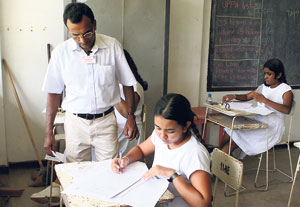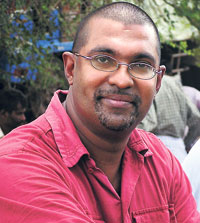 The academic community representing all the national universities in Sri Lanka is currently grappling with a crisis of high magnitude since the Sri Lankan political and administrative system is not fulfilling the promises made over the years to the Federation of University Teachers Associations (FUTA) which represents the body of the professional community of national university academics in Sri Lanka. The academic community representing all the national universities in Sri Lanka is currently grappling with a crisis of high magnitude since the Sri Lankan political and administrative system is not fulfilling the promises made over the years to the Federation of University Teachers Associations (FUTA) which represents the body of the professional community of national university academics in Sri Lanka.
In this context, the member unions of the FUTA having patiently waited for years, held Special General Meetings in their respective universities in the month of June 2010 to consult the academic community on the way forward.
Consequently, the member organizations of FUTA have decided to pursue with strong professional action to get their grievances redressed. They reported these sentiments to the FUTA when they met on June 21 at the University of Colombo.
It was also their position that the FUTA should urgently go before the people since as professionals in higher education we owe our responsibility to the sons and daughters of people of Sri Lanka and their parents.

Dr. Mahim Mendis |
There is a misconception amongst some that the university academics are remunerated adequately in this country. We are however compelled to tell you that what we get is not worth being mentioned!
As it is, in Sri Lanka, a new recruit is paid a little over Rs. 26,000, while a Senior Professor is paid Rs 57,000 with an academic allowance of 25%.
Also, the rate of salary increase for academics has been lower than those of government school teachers over the years.
The salaries of Sri Lankan academics are atrociously poor when we compare our scales with professionals serving other sectors such as the Central Bank in Sri Lanka and academics worldwide.
Also university academics do not enjoy the benefits given to other professionals in Sri Lanka such as medical benefits, housing loans, vehicle loans, etc.
It is absurd for us to even try to compare our salaries with the private sector, although the academics in the national university system have very high postgraduate credentials that match the credentials of academics worldwide, and are providing the nation with trained personnel to man the government, non government and private sectors.
It is a fundamental question as to why the government continues to pay such low salaries to those who man the higher education sector in Sri Lanka. Is the state not mindful that the universities are no longer able to attract qualified personnel since the academic profession is undermined by policy makers with lower salaries, leading to a poor standard of living among those of the professional community of university teachers?
It is relevant to draw attention to the fact that the main policy document of Sri Lanka known as the ‘Mahinda Chinthana Policy’ states clearly that the government would enable our top professionals scattered world-wide to come back to the motherland, and that the government would take steps to prevent brain drain.
However the ground reality is that the national universities are no longer able to attract even the expertise that is locally available and retain the promising young people who join, once they gain postgraduate qualifications.
We believe that it is unthinkable in such a context to mislead those Sri Lankan professionals who have left the country in desperation, when the country in reality has no respect for the educated!
Also, we wish to bring to the attention of the government and the people that it is not reasonable for anyone to expect academics to engage in advanced research when they get a salary which is inadequate to meet basic needs of an academic. If that is the case how can they purchase a basic computer, a simple motor vehicle to travel, and even if they purchase one on a loan, pump fuel?
The large mass of academics cannot afford to build a house and cover costs of basic medical needs of their families. It is timely that the government enables academics to maintain a quality of life harmonious with their status as University Teachers on par with their peers in other countries.
It is ironic that the government splashes colossal hand outs to politicians with questionable credentials and doles out shabby second hand treatment to the academic community who remain to serve the motherland.
If the government continues to be indifferent in the way it has been over the years to the needs of the academic community, what becomes inevitable is the collapse of the higher education sector.
We also hear that Sri Lanka should send abroad scientifically and professionally skilled workers without exporting unskilled labour alone, and to give them skilled training we should provide resources to build the infrastructure.
While all that is good and said with equally good intentions, we as university teachers believe that such injections are likely to be futile unless the government urgently takes meaningful steps to look after the professionals who work in the higher education sector without compelling them to surrender their professional dignity with a poor standard of living in the mother land or seek greener pastures abroad.
Being men and women of education, it has not been an option for national university academics to engage in trade union actions that cripple the lives of innocent youth and discourage the large mass of poor parents who send their children to national universities, when we know that they are already burdened with numerous socio-economic problems.
However, the academic community is frustrated and looking for urgent redress to our problems in the public interest. We wish to state that habitual indifference to our plight on the part of the government should be halted immediately if the higher education sector is to be protected. We therefore remind the politicians and the bureaucracy to honour the promises made to the FUTA by the President himself on 31st January 2008 when he assured us of salary revisions.
It is our humble plea to the people whom we serve, the sons and daughters whom we teach, and their beloved parents, not to allow vicious and reactionary forces to label university teachers as a group of people who desire to cripple their lives, since that could be an easy way to respond to our demands.
There is still time left to be reasonable and rational and resolve this unfortunate situation that has burdened the academic community for years. |

 The academic community representing all the national universities in Sri Lanka is currently grappling with a crisis of high magnitude since the Sri Lankan political and administrative system is not fulfilling the promises made over the years to the Federation of University Teachers Associations (FUTA) which represents the body of the professional community of national university academics in Sri Lanka.
The academic community representing all the national universities in Sri Lanka is currently grappling with a crisis of high magnitude since the Sri Lankan political and administrative system is not fulfilling the promises made over the years to the Federation of University Teachers Associations (FUTA) which represents the body of the professional community of national university academics in Sri Lanka.
